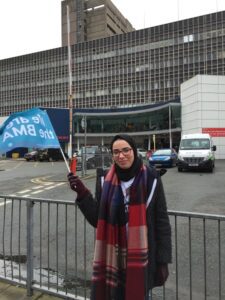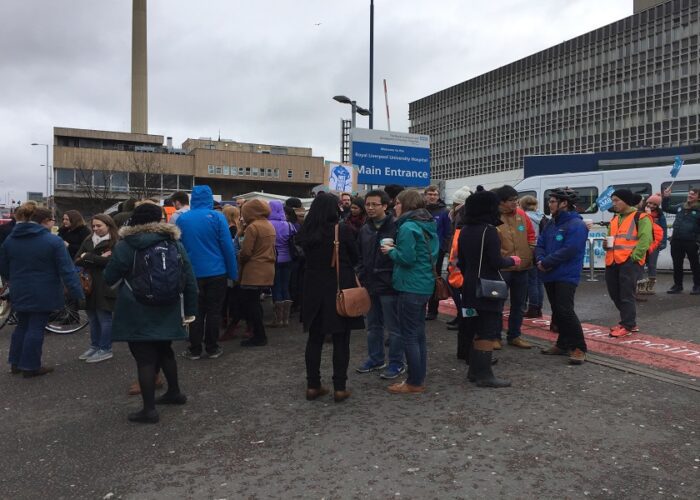
Junior doctors in Merseyside and across England are protesting outside local hospitals in their latest strike action, opposing Health Secretary Jeremy Hunt’s new contract concerning longer hours and a new seven-day NHS.
The first of three planned 48-hour strikes in March and April started on Wednesday morning, as medics demonstrate against the government’s plans to force a change in junior doctors’ pay and working conditions.
It is not known precisely how many staff have joined the protest, although significant numbers have appeared outside local hospital buildings.
Nusbia Taufik, a first year doctor at the Royal Liverpool University Hospital, is one of the local negotiating representatives for the Mersey Regional Junior Doctors’ Committee.
She told JMU Journalism: “None of us want to be here, none of us want to be on strike – we all want to be at work. However, we need to demonstrate these strikes as junior doctors don’t want to be working under the conditions of the contract that Jeremy Hunt is posing for next year and onwards.
“We’re still feeling very positive about the strike and hopefully it will work and we don’t have to be here again.”
The government’s plans for changing junior doctors’ working hours and the wages that they receive from weekend and overnight shifts has caused the outcry from the British Medical Association, with demands for the Government to reconsider Mr Hunt’s controversial proposals.

Ms Taufik claimed “98% of junior doctors have said Hunt’s contract isn’t fair for them”, adding: “More importantly it isn’t safe for patients. The outcome of the Health Secretary’s ignorance for the lack of understanding this contract will cause the dismantling of the NHS.
“More and more junior doctors are leaving to go abroad. Lots of people are now saying that they don’t want to even go into medicine in the first place because of how difficult the working conditions currently are.”
The 24-year-old added: “The public’s support has been really amazing. The people of Liverpool seem to be on our side and we hope this support remains. In the end we’re hopeful that by having the public’s support will force the government to understand what these strikes are truly fighting for – a safer NHS for patients.”
According to NHS England’s latest figures, more than 2,000 inpatient procedures have been cancelled due to the most recent 48-hour strike. Alongside this, more than 3,000 day case operations and procedures have been affected by the industrial action.
A Department of Health spokesman said: “Patients have so far seen more than 19,000 operations cancelled as a result of the BMA’s irresponsible and unjustified industrial action.”

